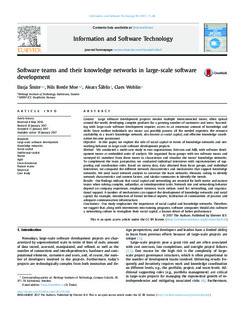| dc.description.abstract | Context: Large software development projects involve multiple interconnected teams, often spread around the world, developing complex products for a growing number of customers and users. Succeeding with large-scale software development requires access to an enormous amount of knowledge and skills. Since neither individuals nor teams can possibly possess all the needed expertise, the resource availability in a team‘s knowledge network, also known as social capital, and effective knowledge coordination become paramount. Objective: In this paper, we explore the role of social capital in terms of knowledge networks and networking behavior in large-scale software development projects. Method: We conducted a multi-case study in two organizations, Ericsson and ABB, with software development teams as embedded units of analysis. We organized focus groups with ten software teams and surveyed 61 members from these teams to characterize and visualize the teams‘ knowledge networks. To complement the team perspective, we conducted individual interviews with representatives of supporting and coordination roles. Based on survey data, data obtained from focus groups, and individual interviews, we compared the different network characteristics and mechanisms that support knowledge networks. We used social network analysis to construct the team networks, thematic coding to identify network characteristics and context factors, and tabular summaries to identify the trends. Results: Our findings indicate that social capital and networking are essential for both novice and mature teams when solving complex, unfamiliar, or interdependent tasks. Network size and networking behavior depend on company experience, employee turnover, team culture, need for networking, and organizational support. A number of mechanisms can support the development of knowledge networks and social capital, for example, introduction of formal technical experts, facilitation of communities of practice and adequate communication infrastructure. Conclusions: Our study emphasizes the importance of social capital and knowledge networks. Therefore, we suggest that, along with investments into training programs, software companies should also cultivate a networking culture to strengthen their social capital, a known driver of better performance. | |

